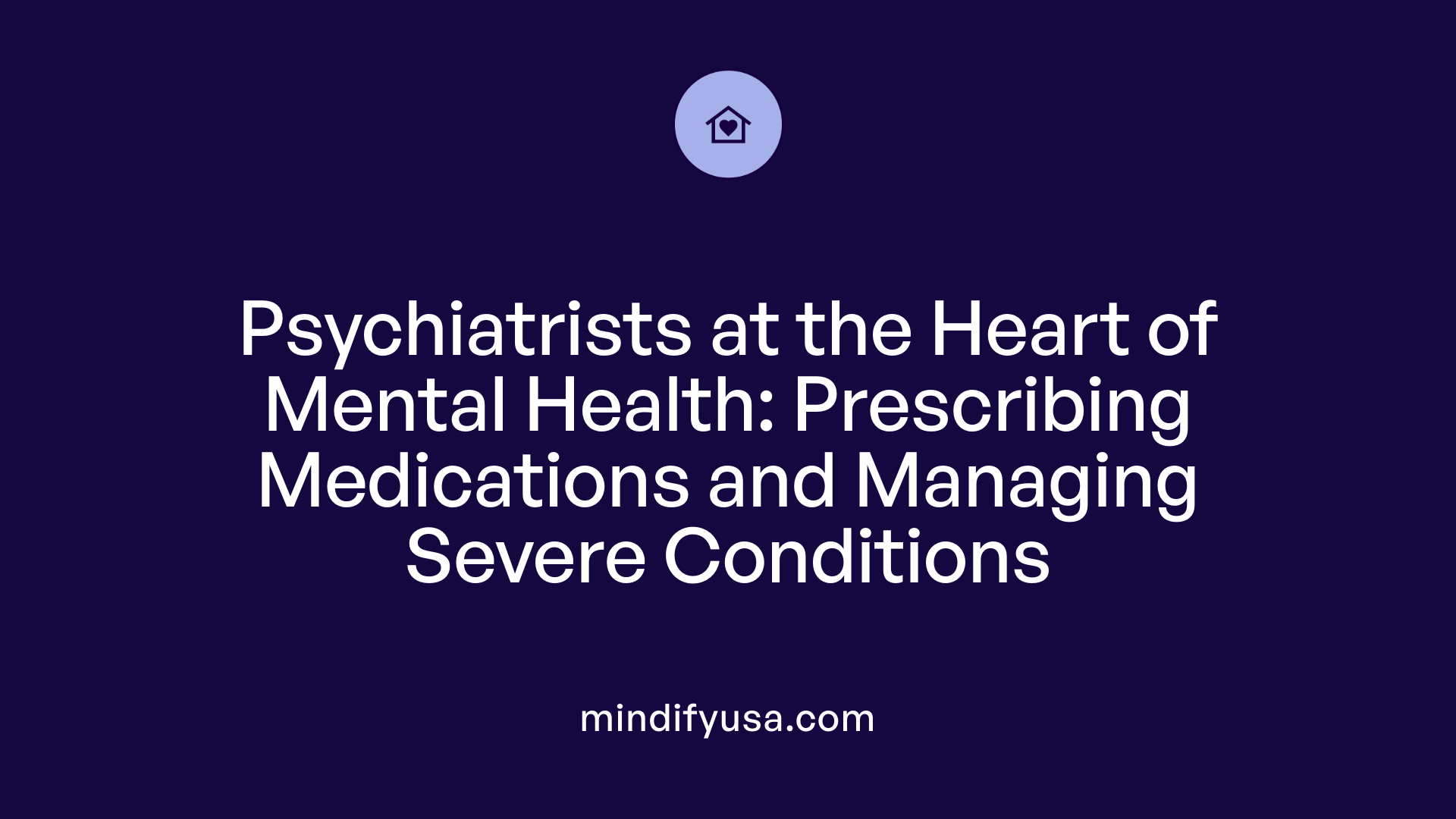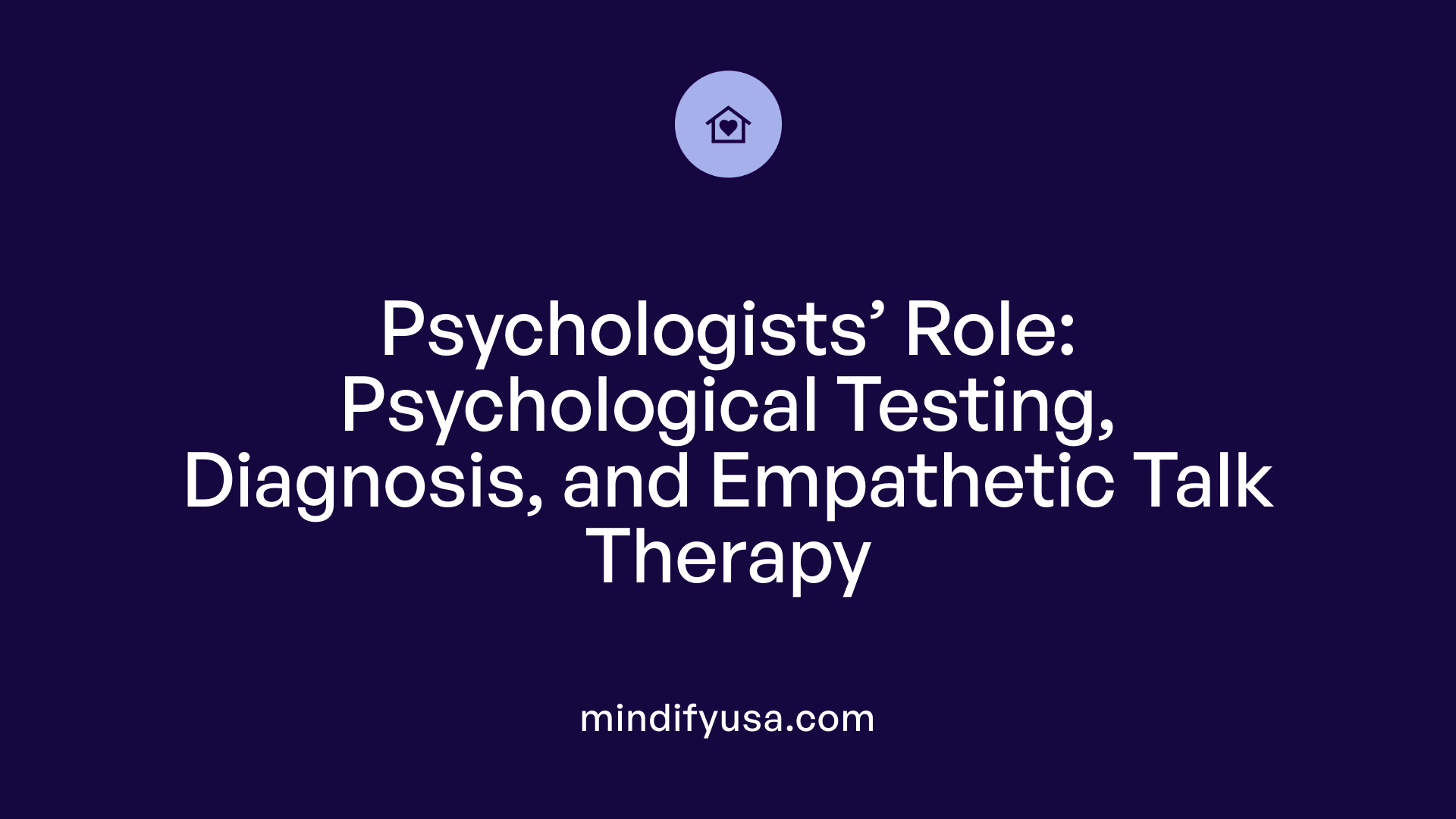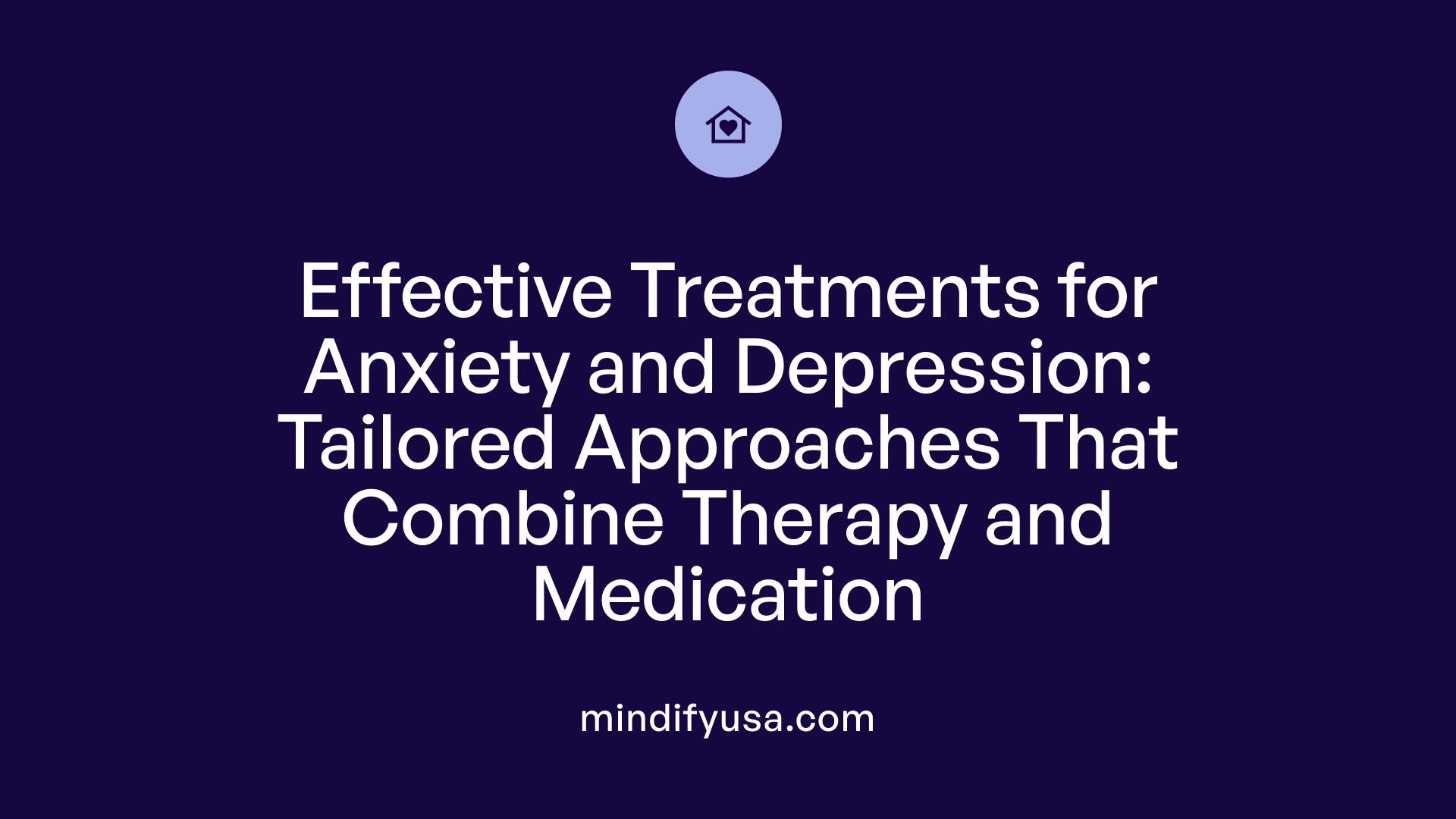Navigating the Landscape of Mental Health Professionals
Mental health treatment involves various professionals, each bringing unique expertise to diagnose, treat, and support individuals facing mental health challenges such as anxiety and depression. Among these, psychiatrists and psychologists are two key providers whose roles, training, and treatment approaches often prompt questions. This article clarifies the distinctions and collaboration between psychiatrists and psychologists, essential for anyone seeking comprehensive mental health services.
Key Facts on Mental Health Professionals and Services
- Psychiatrists are medical doctors with extensive training in diagnosing and managing severe mental health conditions and have the authority to prescribe medications.
- Psychologists hold doctoral degrees and specialize in psychological testing, diagnosis, and providing talk therapy, but generally do not prescribe medications.
- Comprehensive mental health services combine diagnosis, therapy, medication management, and support, delivered by multidisciplinary teams of professionals.
- Psychiatrists focus on biological aspects of mental illnesses, often utilizing medical tests and medications to treat conditions like schizophrenia and bipolar disorder.
- Psychologists employ evidence-based therapies such as CBT and typically perform psychological assessments to diagnose and treat mental health issues.
- Treatment for anxiety and depression often involves a combination of psychotherapy and medication, tailored to individual needs.
- Psychiatrists can prescribe medication and sometimes provide therapy, while psychologists mainly offer psychotherapy and behavioral interventions.
- Effective mental health care involves collaboration among healthcare providers, including psychiatrists, psychologists, social workers, and nurses.
- Barriers such as stigma, resource limitations, and lack of access are addressed through outreach, education, and culturally sensitive practices.
- A holistic approach to mental health emphasizes early detection, prevention, rehabilitation, and community support to improve overall quality of life.
1. Medical Expertise and Treatment Authority: Psychiatrists’ Role

Medical Training and Qualifications of Psychiatrists
Psychiatrists are medical doctors who hold either an MD (Doctor of Medicine) or DO (Doctor of Osteopathic Medicine) degree. Their educational pathway begins with completing a bachelor's degree, followed by four years attending medical school. After medical school, they undergo a four-year residency specializing in psychiatry. This residency includes extensive clinical training focused on diagnosing and managing mental health disorders, with total training time after undergraduate studies being approximately eight years.
Ability to Prescribe Medication
A defining characteristic of psychiatrists is their legal authority to prescribe medications. As licensed physicians, they can prescribe a wide range of psychotropic medications such as antidepressants, antipsychotics, mood stabilizers, and anxiolytics. This medical training enables psychiatrists to manage the pharmacological treatment of various mental illnesses, offering symptom relief and biological stabilization that can be critical for recovery.
Focus on Biological and Physical Aspects of Mental Illness
Psychiatrists have specialized expertise in understanding the complex interactions between the brain, body, and behavior. Since they are trained as medical doctors, they evaluate mental health disorders with attention to biological factors, such as genetic predispositions and neurochemical imbalances. They can assess how physical health impacts mental symptoms and consider the biological underpinnings of psychological conditions.
Use of Medical Tests and Evaluations
Psychiatrists often employ medical investigations to aid in diagnosis and treatment planning. These include ordering laboratory tests like blood work to rule out physical causes of mental symptoms (e.g., thyroid dysfunction or vitamin deficiencies). Additionally, imaging studies might be used to explore neurological contributors to psychiatric symptoms. This approach allows psychiatrists to identify or exclude medical conditions that may mimic or complicate mental illnesses.
Treatment of Severe and Complex Mental Health Disorders
Many psychiatrists focus on severe or complex mental health conditions such as schizophrenia, bipolar disorder, severe depression, and other psychiatric emergencies. Their medical training equips them to manage intricate cases that often require pharmacological interventions alongside therapeutic strategies. Psychiatrists are particularly vital in inpatient settings where stabilization of acute episodes and medication management are essential.
Integration of Psychotherapy with Medication Management
While psychiatrists often emphasize medication management, many also provide psychotherapy or collaborate closely with psychologists and therapists to ensure comprehensive care. Treatment plans from psychiatrists often blend medical interventions with psychological therapies, allowing a holistic approach to mental health. This integrated treatment model tailors care to individual patient needs, optimizing outcomes.
Work Settings and Collaboration Within Multidisciplinary Teams
Psychiatrists work across a broad array of settings including private practices, hospitals (both inpatient and outpatient), community mental health centers, academic institutions, and research facilities. They frequently collaborate with other health professionals such as psychologists, social workers, nurses, psychiatric pharmacists, and primary care providers. Working within multidisciplinary teams facilitates coordinated care that addresses both the biological and psychological dimensions of mental health.
In summary, psychiatrists bring a distinct medical perspective to mental health treatment through their ability to prescribe medication, perform medical assessments, and treat complex psychiatric conditions. Their education and expertise make them essential for managing biological factors and integrating medical and psychological treatments within collaborative care models.
2. Psychotherapy and Psychological Assessment: Psychologists’ Contributions

Educational Background and Doctoral Training of Psychologists
Psychologists typically pursue an extensive educational pathway that includes completing a bachelor’s degree followed by a doctoral degree in psychology, such as a Ph.D. (Doctor of Philosophy), Psy.D. (Doctor of Psychology), or Ed.D. (Doctor of Education). This educational journey usually spans 5 to 7 years at the doctoral level and includes rigorous coursework, research, and clinical internships. These programs focus on human behavior, psychological theory, assessment, and therapeutic techniques.
Focus on Psychological Testing, Diagnosis, and Talk Therapy
Unlike psychiatrists, psychologists are not medical doctors and generally do not prescribe medication. Instead, they specialize in psychological testing, diagnosis, and the provision of talk therapy. They utilize detailed psychological assessments to evaluate cognitive, emotional, and behavioral functions. These assessments help in diagnosing mental health conditions such as anxiety, depression, phobias, post-traumatic stress disorder (PTSD), and obsessive-compulsive disorder (OCD).
Use of Evidence-Based Therapies Like Cognitive-Behavioral Therapy (CBT)
One of the primary therapeutic approaches psychologists employ is cognitive-behavioral therapy (CBT), an evidence-based intervention focused on identifying and modifying negative thought patterns and behaviors. Psychologists may also utilize other therapy modalities such as psychodynamic therapy, dialectical behavior therapy, humanistic therapy, and other specialized approaches tailored to the individual's needs. These therapies aim to improve coping mechanisms, emotional regulation, and overall psychological well-being.
Non-Prescription of Medication Except in Special Cases
While psychologists are extensively trained in psychotherapy and psychological evaluation, they generally cannot prescribe medications. In some U.S. states, with additional licensure and training, psychologists may have limited prescription privileges, but this is the exception rather than the norm. Instead, when medication might be necessary, psychologists frequently collaborate with psychiatrists or other medical professionals who manage pharmacological treatments.
Frequent Therapeutic Engagement and Behavioral Interventions
Psychologists often maintain more frequent contact with their clients than psychiatrists, especially through ongoing therapy sessions. This frequent engagement allows psychologists to monitor patient behaviors and mental health symptoms over time closely. They provide behavioral interventions and support strategies that help clients manage their symptoms and improve daily functioning.
Collaboration with Psychiatrists for Comprehensive Care
Psychologists and psychiatrists frequently work collaboratively, combining their skills to provide comprehensive mental health care. While psychologists deliver psychotherapy and behavioral interventions, psychiatrists can offer medication management and medical assessments. This partnership allows for an integrative approach where biological and psychological aspects of mental health conditions are addressed cohesively. For example, a patient may see a psychologist for cognitive-behavioral therapy while also consulting a psychiatrist for medication to manage severe or complex symptoms.
Variety of Work Environments Including Private Practice and Community Settings
Psychologists work across a broad spectrum of settings. These include private practices, hospitals, academic centers, community health clinics, schools, and research institutions. In these environments, they often collaborate with other healthcare professionals such as social workers, psychiatric nurses, counselors, and medical doctors. Their flexible work settings enable them to serve diverse populations and apply psychological interventions in a variety of contexts.
| Aspect | Psychologists' Role | Details |
|---|---|---|
| Education and Training | Doctoral degree (PhD, PsyD, EdD) | 5-7 years of doctoral study including clinical internships |
| Therapeutic Methods | Evidence-based therapies including CBT | Focus on thought-behavior patterns, emotion regulation |
| Psychological Assessment | Conducts psychological testing and diagnosis | Uses assessment tools to diagnose and monitor mental health conditions |
| Prescription Rights | Generally do not prescribe medication | Except in special cases with additional licensure |
| Patient Engagement | Frequent therapy sessions | Long-term behavioral interventions and symptom monitoring |
| Collaborative Care | Works with psychiatrists and other professionals | Integrates psychotherapy with medication management |
| Work Settings | Diverse environments | Private practice, hospitals, schools, community clinics |
Defining Comprehensive Mental Health Services

What are comprehensive mental health services?
Comprehensive mental health services represent a holistic, multidimensional approach to supporting individuals' mental well-being. These services cover a broad spectrum of interventions, combining diagnosis, therapy, medication management, crisis intervention, and ongoing support tailored to a variety of mental health conditions such as anxiety and depression.
Scope and Elements of Comprehensive Mental Health Care
These services integrate medical and psychological components, addressing biological, psychological, and social aspects of mental health. This includes:
- Accurate diagnosis through psychiatric evaluation or psychological assessment
- Medication management, primarily overseen by psychiatrists
- Evidence-based therapies such as cognitive-behavioral therapy (CBT) offered by psychologists and therapists
- Continuous monitoring and adjustment of treatment plans
- Crisis intervention and rehabilitation services
- Social support through community engagement
Integration of Diagnosis, Therapy, Medication, and Support
Effective care involves combining medication prescribed by psychiatrists with psychotherapy facilitated by psychologists or therapists. This integrative approach ensures treatment addresses both physical and emotional needs. Psychiatrists can order medical tests to exclude physical causes of symptoms, while psychologists focus on behavior and cognitive interventions.
Collaboration Among Multidisciplinary Healthcare Professionals
Comprehensive mental health care is usually delivered by multidisciplinary teams that include psychiatrists, psychologists, therapists, social workers, psychiatric nurse practitioners, and pharmacists. These professionals collaborate closely, exchanging referrals and coordinating care to improve outcomes.
Addressing Barriers like Stigma and Resource Gaps
A significant part of comprehensive care is overcoming stigma and resource limitations that prevent people from seeking help. Outreach, education, and culturally sensitive practices aim to make mental health services more accessible and acceptable.
Holistic Approach Including Mental, Physical, and Social Dimensions
The approach recognizes the interconnectedness of mental health with physical and social factors. It promotes overall wellness through early detection, prevention, rehabilitation, and community support, enhancing quality of life beyond symptom reduction.
Treatment Approaches for Anxiety and Depression Within Mental Health Services

How are anxiety and depression treated within mental health services?
Anxiety and depression are treated through personalized and often combined approaches in mental health care. The treatment usually includes psychotherapy, medication, or both, depending on the severity and nature of the condition.
Combination of psychotherapy and medication in treatment
Psychiatrists play a crucial role by prescribing medications such as antidepressants (SSRIs, SNRIs), benzodiazepines, or beta-blockers to manage symptoms effectively. They may accompany medication management with psychotherapy or collaborate with psychologists for therapy services. This medical intervention is especially important for moderate to severe or biologically-influenced cases.
Role of cognitive-behavioral therapy (CBT) and exposure therapy
Psychologists primarily provide evidence-based psychological therapies like cognitive-behavioral therapy (CBT), which focuses on changing thought patterns and behaviors that contribute to anxiety and depression. Exposure therapy, a subtype of CBT, helps patients gradually face their fears in a controlled manner, reducing avoidance behaviors.
Psychiatrists' ability to prescribe medication and provide therapy
Psychiatrists are medical doctors who assess both the physical and mental aspects of mental health conditions. Their ability to prescribe medication allows them to manage complex cases with biological components effectively. They may also provide therapy themselves or coordinate psychotherapy with psychologists and other therapists.
Psychologists' provision of talk therapy and psychological techniques
Psychologists hold doctoral degrees specializing in psychological assessment and treatment through talk therapies. Although they typically do not prescribe medications, they offer comprehensive psychotherapy techniques to address emotional and behavioral issues linked to anxiety and depression.
The individualized nature of treatment plans
Treatment plans for anxiety and depression are tailored to each patient's unique needs, symptom severity, and preferences. Some may require medication alongside therapy, while others benefit solely from psychological interventions. The collaborative efforts between psychiatrists and psychologists ensure that care is holistic and personalized.
Ongoing monitoring and adjustment of therapies and medications for effectiveness
Both psychiatrists and psychologists monitor patient progress regularly. Medication dosages may be adjusted, and therapy approaches refined to increase effectiveness. This ongoing assessment helps ensure that symptoms reduce and patients regain optimal functioning over time.
Bridging Expertise for Comprehensive Mental Health Care
Psychiatrists and psychologists play distinct yet complementary roles in mental health care. Psychiatrists bring medical expertise and the capability to prescribe medications, addressing the biological basis of mental health disorders and managing complex cases. Psychologists contribute specialized knowledge in psychological assessment and evidence-based therapies, offering vital support through talk therapy and behavioral interventions. Together, through collaboration and integrated care approaches, these professionals ensure that individuals receive holistic, personalized treatment for conditions like anxiety and depression. Understanding their different functions helps patients make informed decisions and access the best possible support on their mental health journey.
References
- Psychologist vs Psychiatrist - What Is the Difference?
- Difference Between Psychiatrist, Psychologist & Therapist
- Psychology vs Psychiatry: Understanding the Key Differences
- Types of Mental Health Professionals
- Psychologist vs Psychiatrist: What Is the Difference?
- What Is the Difference Between Psychologists ...
- What Is the Difference Between a Psychologist and ...
- The Role of Psychiatrists & Psychologists in Mental Health ...
- Psychiatrist vs Psychologist for Anxiety: Which is Right for ...
- Anxiety disorders - Diagnosis and treatment





































































































